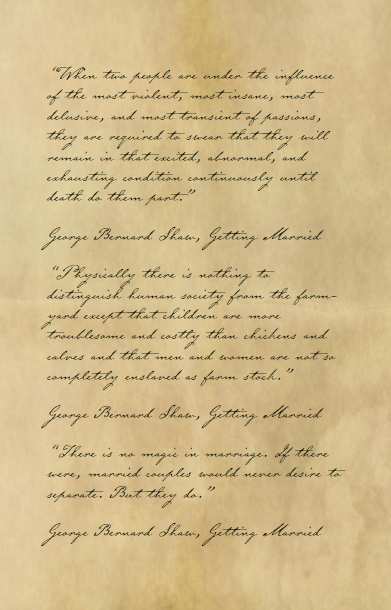George Bernard Shaw was a winner of the Nobel Prize for Literature. He was an Irish playwright, critic, and polemicist whose influence on Western theatre, culture, and politics extended from the 1880s to his death and beyond.
In one of his full-length plays, entitled “Getting Married,” Shaw has shown his insight about marriage and partnerships in all forms.
Shaw’s contributions to literature and the arts were marked by a sharp wit and a keen sense of social commentary. Through his works, he delved into the complexities of human relationships, often challenging conventional norms. ‘Getting Married,’ for instance, serves as a poignant exploration of the institution of marriage, questioning its traditional roles and expectations. Shaw’s characters grapple with the intricacies of commitment, autonomy, and societal pressures, offering readers a thought-provoking glimpse into the dynamics of partnerships. His ability to infuse his plays with both intellectual depth and relatable human experiences solidifies his legacy as a literary luminary, transcending time and cultural boundaries.
Here are some quotes on the said play:
“When two people are under the influence of the most violent, most insane, most delusive, and most transient of passions, they are required to swear that they will remain in that excited, abnormal, and exhausting condition continuously until death do them part.”
― George Bernard Shaw, Getting Married“Physically there is nothing to distinguish human society from the farm-yard except that children are more troublesome and costly than chickens and calves and that men and women are not so completely enslaved as farm stock.”
― George Bernard Shaw, Getting Married“There is no magic in marriage. If there were, married couples would never desire to separate. But they do.”
― George Bernard Shaw, Getting Married
As you can see, he defines marriage and partnership as a very chaotic platform of love and passion. In most relationships and marriages, there is a certain stigma that it would be the end of a so-called honeymoon period. George Bernard Shaw tackled the issue with an elegant but very profound definition. It has been one of the most realistic pieces of advice in the romantic and monogamist style of relationship.
From one of our famous writers, this play depicts the role of two people who are to stay together in times of agreement and disagreement or separate if necessary. Although some may not experience relationships like what he undertook in his work, many have related to the feelings of both the writer and the characters in this piece that George Bernard Shaw has written. In most cases, we believe that writing is the purest form of consolidated expression. As for George Bernard Shaw, this play is his consolidated advice.

